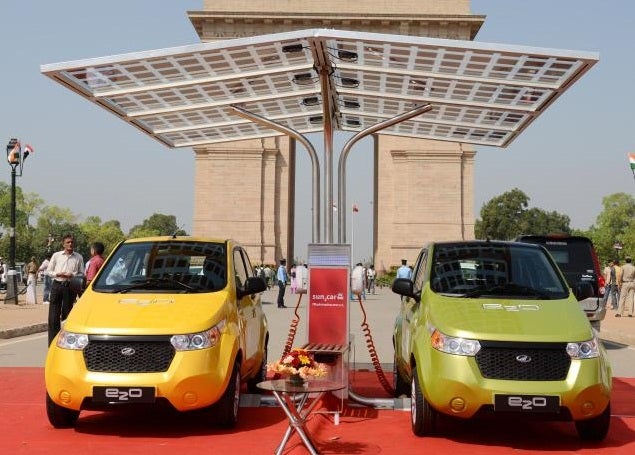Indian engineering excellence - new Reva electric car coming to UK
The dream is that the e20 could become the first electric automobile to make a profit

Your support helps us to tell the story
From reproductive rights to climate change to Big Tech, The Independent is on the ground when the story is developing. Whether it's investigating the financials of Elon Musk's pro-Trump PAC or producing our latest documentary, 'The A Word', which shines a light on the American women fighting for reproductive rights, we know how important it is to parse out the facts from the messaging.
At such a critical moment in US history, we need reporters on the ground. Your donation allows us to keep sending journalists to speak to both sides of the story.
The Independent is trusted by Americans across the entire political spectrum. And unlike many other quality news outlets, we choose not to lock Americans out of our reporting and analysis with paywalls. We believe quality journalism should be available to everyone, paid for by those who can afford it.
Your support makes all the difference.On my first visit to India in 1982, an engineering enthusiast and perfectionist called Sudarshan Maini held up a small precision-tuned automotive component. “This is what we can produce in India,” he proudly told me. It had been made by Maini Precision Products, a company he had set up nine years earlier in Bangalore to prove he could turn out international quality engineering components to tiny tolerances and attract export customers with levels of precision that were all but unknown in the country. By 1982, customers included Bosch and General Motors.
That enthusiasm and drive for engineering perfection led yesterday to the launch at Delhi's India Gate of the latest model of the Reva plastic-bodied electric city car, which Sudarshan’s youngest son, Chetan, has spent 15 years pioneering. The good-looking e20 four-seater is now produced by the Mahindra autos-based group. It replaces a more basic Reva and breaks new ground with all-electric power and zero emissions and solar power battery-charging ports. New technologies give drivers access to their car from a smart phone app to control air conditioning and locking controls, and to trigger a remote emergency battery charge system.
This is a story of frugal engineering innovation, in which the Mainis specialise, coupled with the commercial and design capabilities of Mahindra. Chetan Maini’s interest in electric cars began with model vehicles when he was a child. While studying at the University of Michigan in the US, he worked in 1990 on the General Motors’ award winning Sunracer solar powered racing car.
In 1994, he co-founded the Reva Electric Car Company in Bangalore, to produce what became India’s first electric car. Initially developed by Chetan in America, some components were sent out by his family from India to cut costs. Assembly started in 2001, with five people producing the first seven vehicles. To avoid having to build an assembly track for the small quantities, the car body’s tubular metal frame was put on wheels and pushed down the production line.
Eventually, the Reva (named after Chetan’s mother) needed more funds than the family were prepared to risk, and in 2010 the Mahindra group bought a 56% stake in a new company, Mahindra Reva Electric Vehicles, putting in a total investment of Rs100 crore ($18m). The Maini family holds a 24.6% stake.
The e20 is being produced at a new factory in Bangalore that is 35% powered by solar energy and can produce 30,000 cars a year – small by auto industry standards but substantial for electric vehicles. The immediate sales target is 400-500 vehicles a month, 150 to 200 of them in Delhi which Mahindra expects to be the biggest market. The batteries have a 100km driving range and take five hours to re-charge from any 15A power socket.
The dream is that the e20 could become the first electric car in the world to make a profit. Priced at Rs.5.96 lakhs (about $11,000) after environment-friendly subsidies available in Delhi, it is not cheap. The figure would be lower if the central government introduced national subsidies that were expected but failed to appear in last month’s Budget. Exports to Europe are planned in six to nine months (some original Revas can be seen on the streets of London), and Mahindra is also planning battery-power two-wheelers.
It seems sad for the Maini family, which had put so much effort and money into the project for 15 years, to have to lose control. “We had mixed emotions about letting go,” says Sandeep Maini, Chetan’s elder brother and now chairman of the Maini group, whose diversifications include higher levels of precision engineering for defence and aviation companies like BAE and Boeing.
“We didn’t have deep pockets – we were technical creators and we also needed competence to develop markets and car manufacturing processes,” he adds.
Mahindra met those requirements. Anand Mahindra, chairman of the family-controlled group, is committed to using frugal engineering to drive innovation. Having talked to various other companies, the Mainis felt that he had the most commitment to electric vehicles and appreciation of what Chetan, who is still involved as Mahindra Reva’s chief of technology and strategy, had been trying to achieve. “This is not just about selling a car, it is about telling people to change their lifestyle,” Mahindra said yesterday “We are working at creating an ecosystem that includes mobility solutions along with other environment-friendly innovations”.
The story shows what India can do. Three government ministers inevitably flocked around the launch at India Gate, seeking instant photo-opportunities and publicity, but they are not relevant to what has been achieved here with the original Reva, and the e20, by one young engineer, his supportive family, and now a bigger innovation-oriented family group.
Join our commenting forum
Join thought-provoking conversations, follow other Independent readers and see their replies
Comments